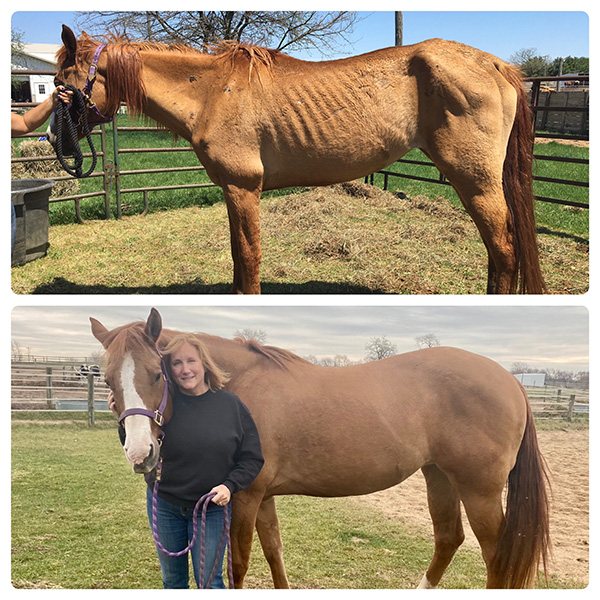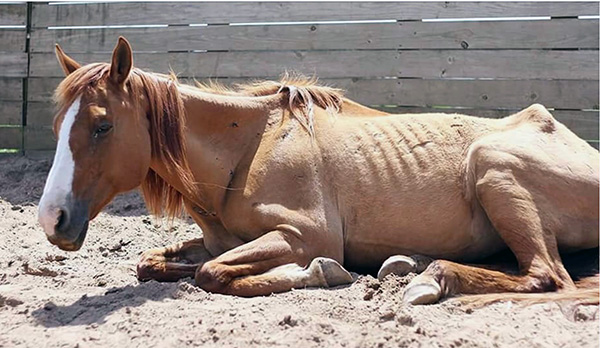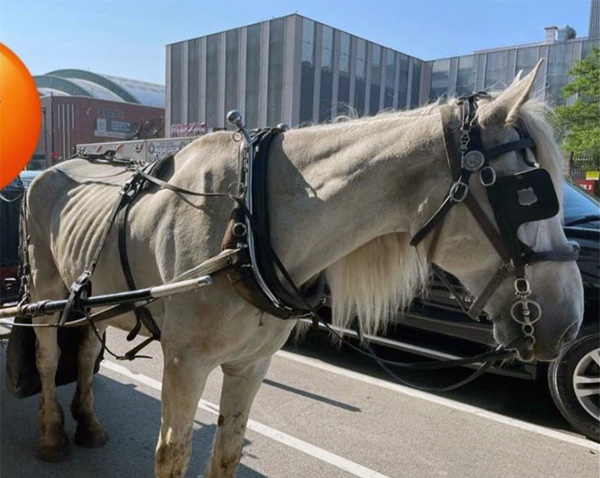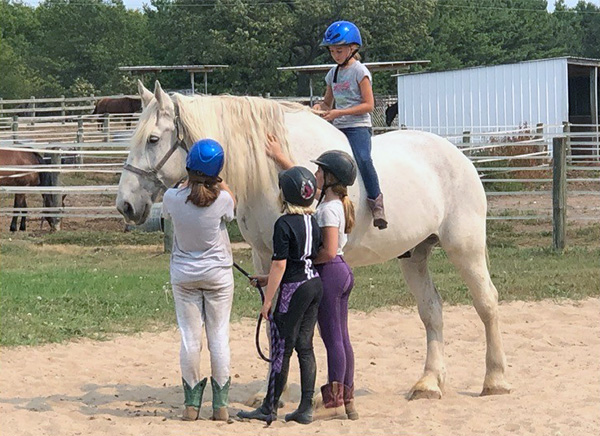
Top: Hope when she first came to Riding With Angels. Bottom: Dana with Hope, after four years of TLC.

Riding With Angels is holding an open house and fundraiser on Saturday, August 27. Click to enlarge the image.
Information Systems vice president Dana Scherff has loved horses since childhood. But outside of taking riding lessons for a couple of summers when she was very young, her love has gone unrequited until now.
Four years ago, Dana started volunteering with Riding With Angels, a Palmyra nonprofit dedicated to rescuing abused and neglected horses. She worked with all of the group’s rescues, but bonded with one horse in particular — and now that horse, Hope, is Dana’s.
“I was always the person in the car saying, ‘Look — horses!’ when driving along,” Dana says. “My husband knew my goal at some point in my life was to have a horse.”
Hope doesn’t have any records, but based on her teeth, she is in her early twenties. (The average life span for a horse is 25 to 30 years.) Her story is “pretty gruesome,” Dana says.

Another photo of Hope not long after she arrived at Riding With Angels.
Businesses called “kill pens” buy unwanted horses cheaply at auction. The kill pens then either sell the horses to be slaughtered for meat in Canada or Mexico (horse slaughter is illegal in the United States), or post pictures of each animal asking someone to buy it — or “bail it out” — before it’s shipped to slaughter. “The owners of kill pens do not take care of the horses. The horses are underfed, under-watered, little or no vet care,” Dana says.
Like many similar nonprofits, Riding With Angels usually doesn’t take in rescues from kill pens, because doing so perpetuates the kill pens’ business model. But several years ago, the group was moved to do so after seeing some animals in especially bad shape. When the horses arrived, three had to be put down immediately because of injuries. Six others, though, were saved by Riding With Angels. The group needed help caring for all of the new animals, and Dana reached out to volunteer after hearing the story from friends.

Nick, another Riding With Angels rescue, was a carriage horse in Milwaukee. His owner surrendered him to the nonprofit after a photo of him looking unhealthy while pulling a carriage was posted on social media.
Getting close to Hope, one of the six survivors of the kill pen delivery, took patience, Dana says.
“She didn’t trust me at all,” Dana says. “In the beginning, when I tried to lead her to graze, she would stop and not move. It’s hard to move a 1,000-pound animal if they don’t want to move. She didn’t trust me. She probably thought I was taking her somewhere unsafe again.”
Hope was malnourished and terribly underweight, and had “pretty much lost all of her fur from her withers to tail,” Dana remembers. (The withers is the ridge between a quadruped’s shoulders.) “I’ll never forget the first time I saw her — she had no life in her eyes. She looked like she had given up.”
Gradually, by brushing Hope, giving her lice treatments, and “just hanging out with her,” Dana won the horse’s trust.
“It took two years to get her to load into a trailer so we could go on a trail ride. She was so afraid of getting back into a trailer, but after a lot of patience and care, she finally trusted me enough to do what I asked,” Dana says. “Now she nickers when she sees me and comes to the gate when I’m walking down the lane. We are buddies. It’s wonderful.”

Nick, looking much happier and healthier thanks to Riding With Angels.
Dana typically spends three or four nights a week at the Riding With Angels barn, working with Hope and other horses. The nonprofit also operates a horsemanship program for at-risk youth, but she has had limited opportunities to help out with that aspect of the work because it takes place during business hours. She notes that “it’s another very rewarding experience to see young people who don’t have exposure to horses get to know them and learn about their care.”
Dana has helped plan Riding With Angels’ fundraiser and open house, which takes place Saturday, August 27. You can find more information on Facebook by searching for “riding with angels wisconsin” or by emailing Dana. “They do amazing work,” she says. “Everyone who sees the horses they’ve saved is grateful for their incredible care.”
